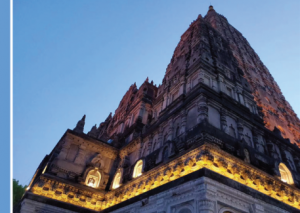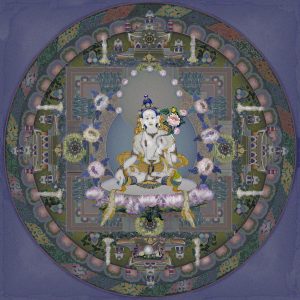
A summary of the mind of merit-dedication and rebirth-aspiration
By relying on the general understanding of the dedication of merit in the traditional bodhisattva teachings, some Pure Land practitioners misinterpret the “mind of merit-dedication,” believing that it means to accumulate merit through self-powered practices (called “wholesome roots” or “roots of virtue”) and to dedicate this merit toward birth in the Pure Land. Further, aspiring to be reborn in the Land of Bliss is generally known as having the “mind of rebirth-aspiration.” The combination of this attitude with the desire to transfer one’s roots of virtue to this end is called the “mind of merit-dedication and rebirth-aspiration.”
However, in pristine Pure Land Buddhism, the mind of merit-dedication and rebirth-aspiration, as interpreted by Master Shandao, has a different meaning; here, it means to “give up,” with genuine and deep faith, all past and present roots of virtue stemming from our own practices (including our rejoicing in others’ roots of virtue) for the goal of attaining rebirth in the Pure Land.
As discussed in my last article, it may be very difficult for some Buddhist practitioners to accept this concept. This is because they believe that the merit and virtue they have attained through both meditative and non-meditative practices have great value and that these enable them to purify their karmic obscurations, gain wisdom, and achieve rebirth in the Land of Bliss.
However, if they are told that their own virtuous actions and practices are impure, generate unreal karmic results, and are incompatible with and inapplicable to their goal of attaining rebirth in the Land of Bliss, they might feel defensive, and even reluctant to surrender their merit in order to achieve their aim. They might react with confusion to the idea that they would be required to seek pure and real merit from Amitabha Buddha (through Amitabha-invocation) if they aspire to “depart” from this world and be reborn in the Pure Land. Indeed, they will need great humility to give up the belief in their own roots of virtue and rely entirely on Amitabha.
For all followers of Shakyamuni Buddha who begin to practice Pure Land teachings, this is an important “turning” point known as “establishing the Sincere Mind.” This is clearly explained by Master Shandao in his explication of the Sincere Mind in the Commentary on the Contemplation Sutra.
Moreover, Master Shandao states that the “mind of dedication-aspiration” should be one-pointed, meaning that pristine Pure Land practitioners should focus exclusively on the practice of Amitabha-invocation. They should understand clearly that only the real merit implicit in Amitabha’s name is “valid” and aligned with Amitabha’s Fundamental Vow, and that this alone will enable them to attain rebirth in his Pure Land.
Pristine Pure Land practitioners are also required to dedicate or surrender not only the roots of virtue from their own meditative and non-meditative practices, but also their rejoicing in the roots of virtue planted by others (not good deeds that they themselves have performed, but those of others, in which they rejoice as if they were their own). This is the general understanding of “rejoicing” in Buddhism—when we rejoice in others’ wholesome practices, we are considered to enjoy the same merit and roots of virtue as they do.
Three in one
Although the scriptures speak of the Three States of Mind,* this does not mean there are actually three separate and independent mental states. They are merely descriptions of three different aspects of the same state of mind: reliance on Amitabha Buddha and aspiration to attain rebirth in his Pure Land. We stress the genuineness of this aspiration in the Sincere Mind and highlight its steadfastness in the Deep Mind. How does this genuine and resolute mind manifest? The answer is, in the Dedication-aspiration Mind.
Another way to think about this is as follows: first, we need to relinquish our sense of independence and rely on Amitabha Buddha, establishing a resonance between the internal (mind) and the external (action). This is the Sincere Mind. When this genuine mind becomes firm and unwavering, it can be transformed into the Deep Mind through exclusive Amitabha-invocation. If this sincere and unwavering mind then turns toward the Pure Land, it is called the Dedication-aspiration Mind.
The Commentary on the Contemplation Sutra says: “With a resolute and genuine mind (Deep Mind and Sincere Mind), we dedicate merit and aspire” to be reborn in the Land of Bliss (Dedication-aspiration Mind). Thus, the Three States of Mind are really a single condition of mind—that of relying on Amitabha Buddha and aspiring to reborn in his Pure Land. The former leads to the latter, while the latter embraces the former.
Further remarks on the Three States of Mind, and particularly the Dedication-aspiration Mind
To counter insincerity, we speak of genuine mind. To mitigate doubt, we explain the Deep Mind. And, to correct a deficiency in dedication or aspiration, we expound the Dedication-aspiration Mind.
Each of the three states of mind can be discussed from the perspective of Amitabha Buddha as well as from the viewpoint of sentient beings. With respect to Amitabha, he genuinely and resolutely dedicates his virtue and merit to iniquitous ordinary beings, wishing to deliver them from suffering through rebirth in his Pure Land.
With respect to sentient beings, when they take Refuge in Amitabha Buddha with the single-minded aspiration to be reborn in his Pure Land, they should exclusively invoke his name. As such, they will naturally give rise to the Three States of Mind. Since their faith is aligned with Amitabha’s vows of deliverance, they are constantly held in his embrace. He penetrates their minds in the form of infinite light, and during their exclusive practice of Amitabha-recitation, bestows all the merit necessary for their rebirth in the Land of Bliss.
One last point before we leave this topic: in Pure Land Buddhism, merit-dedication takes the forms of “departure” and “return.” When we cultivate merit and dedicate it toward our own rebirth in the Pure Land, it is called “merit-dedication of departure”—that is, departing from this world and arriving in that land. “Merit-dedication of return” is when we resolve to return to this defiled realm to deliver ordinary beings from suffering after being reborn in the Land of Bliss.
*The Three States of Mind:
1. The Sincere Mind
2. The Deep Mind
3. The Mind of Merit-dedication and Rebirth-aspiration (Mind of Dedication-aspiration)











